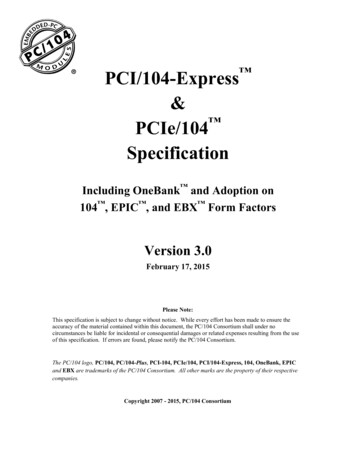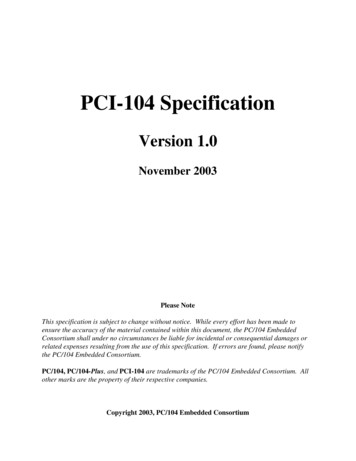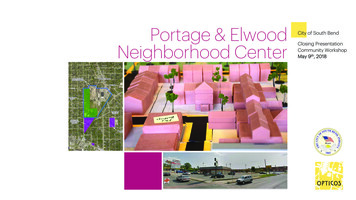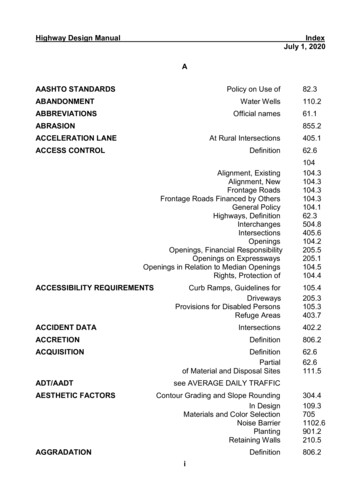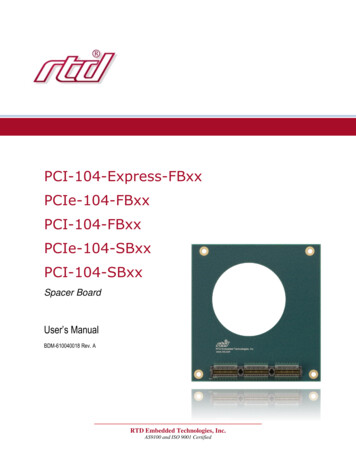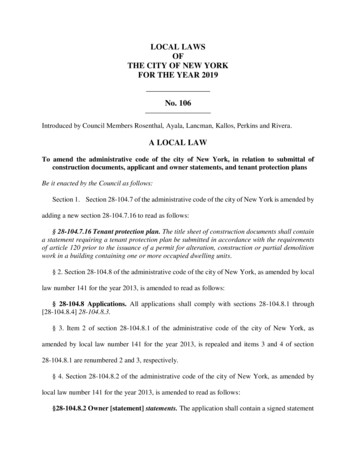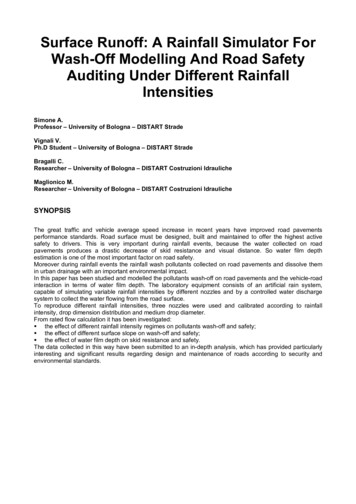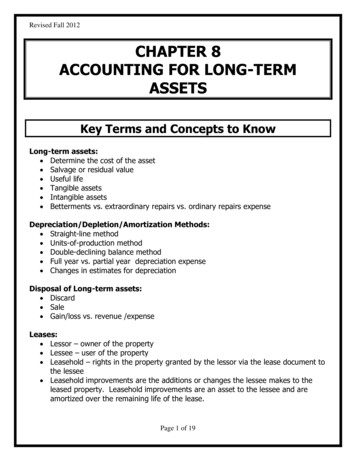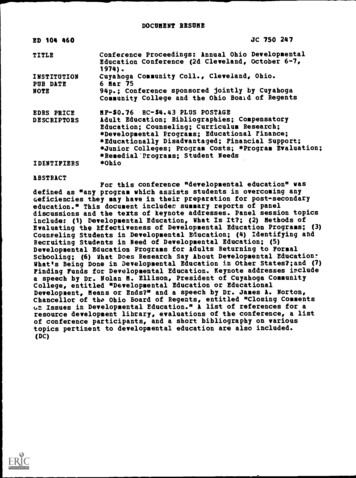
Transcription
DOCUMENT RESUMEJC 750 247ED 104 460TITLEConference Proceedings: Annual Ohio DevelopmentalEducation Conference (2d Cleveland, October 6-7,INSTITUTIONPUB DATENOTECuyahoga Community Coll., Cleveland, Ohio.6 Mar 7594p.; Conference sponsored jointly by CuyahogaCommunity College and the Ohio Board of RegentsEDRS PRICEDESCRIPTORSMF-S0.76 HC - 4.43 PLUS POSTAGEAdult Education; Bibliographies; CompensatoryEducation; Counseling; Curriculum Research;*Developmental Programs; Educational Finance;*Educationally Disadvantaged; Financial Support;*Junior Colleges; Program Costs; *Program Evaluation;*Remedial-Programs; Student Needs*Ohio1974).IDENTIFIERSABSTRACTFor this conference "developmental education" wasdefined as "any program which assists students in overcoming anydeficiencies they may have in their preparation for post-secondaryeducation." This document includes summary reports of paneldiscussions and the texts of keynote addresses. Panel session topicsinclude: (1) Developmental Education, What Is It?; (2) Methods ofEvaluating the Effectiveness of Developmental Education Programs; (3)Counseling Students in Developmental Education; (4) Identifying andRecruiting Students in Need of Developmental Education; (5)Developmental Education Programs for Adults Returning to FormalSchooling; (6) What Does Research Say About Developmental Education?What's Being Done in Developmental Education in Other States?;and (7)Finding Funds for Developmental Education. Keynote addresses includea speech by Dr. Nolan N. Ellison, President of Cuyahoga CommunityCollege, entitled "Developmental Education or EducationalDevelopment, Means or Ends?" and a speech by Dr. James A. Norton,Chancellor of the Ohio Board of Regents, entitled "Closing Comments(An Issues in Developmental Education." A list of references for aresource development library, evaluations of the conference, a listof conference participants, and a short bibliography on varioustopics pertinent to developmental education are also included.(DC)
U S DEPARTMENT OF HEALTHEDUCATION & WEIFANENATIONAL INSTITUTE OFEDUCATION-I ;1 OUi1!f,.fOCONFERENCE PROCEEDINGSLA)Second Annual OhioDevelopmental EducationIpConferenceOctober 6-7, 1974Co-sponsored by:Ohio Board of RegentsandCuyahoga Community CollegeOffice of Institutional Research and EvaluationOffice of Executive Vice PresidentMarch 6, 1975Cuyahoga Community CollegeCleveland, Ohio 441152
TABLE OF CONTENTSPageI.Introduction1II. Conference Program Listing4III. Sessions and SpeechesA.Session I:"Developmental Education, What is It?"12B.Session IV:"Methods of Evaluating the Effectivenessof Developme-tal Education Programs"16"Counseling Students in DevelopmentalEducation"21Banquet Address, "Developmental Education or Educational Developmental, Meansor Ends?"26"Identifying and Recruiting Students inNeed of Developmental Education."35"Developmental Education Programs forAdults Returning to Formal Schooling"40"What Does Research Say About Developmental Education? What's Being Done inDevelopmental Education in Other States?"44"Finding Funds for DevelopmentalEducation"50Luncheon Address, "Closing Comments onIssues in Developmental Education"58C.D.E.F.G.H.J.Session V:Session VI:Session VIII:Session IX:Session X:Session XI:Session XII:64IV. Conference Evaluation72V. Conference InformationVI. Reference Materials on Developmental Education390
INTRODUCTIONOn October 6 and 7, 1974 the Second Annual Ohio DevelopmentalEducation Conference was held in Cleveland, cosponsored by the OhioBoard of Regents and Cuyahoga Community College. Conference activitieswere held on the Metropolitan Campus of Cuyahoga Community College andat the nearby Hollenden House. Over 200 persons attended or participated in the Conference sessions, representing nearly 60 campuses ofhigher learning from all areas of the state of Ohio. The confereesbrought to this assembly a broad composition of institutional positions,viewpoints, and knowledge on the subject of developmental education.Their interest and enthusiasm to improve developmental activities intheir institutions was the inspiration for the Conference and the goaltoward which it was directed.This Conference was the second annual statewide event to exchangein ormation, discuss issues, and promote program development in develTheo ental education under the aegis of the Ohio Board of Regents.first in this series was held in the fall of 1973 at The Ohio StateUniversity. The Ohio Board of Regents and many interested educators inthe state promoted the conference to bring together public and private,two-year and four-year institutions, to facilitate communication andfurther understanding among educators about this vital new area inhigher education. The response both in 1973 and 1974 has been veryfavorable.The 1974 Conference continued to work with a broad definition ofdevelopmental education: programs within institutions of higher learning which provide assistance to students to help them overcome anydeficiencies they may have in their preparation for post-secondary eduHistorically this effort focused on remediation in academiccation.work, with the goal of bringing each student's academic performance "upto the norm." Today the attitudes and values of this notion are beingInstitutions see themselves having an opportunity to provideextended.for different learning levels and styles among their students. Theirgoal is to develop institutional flexibility to meet a wider range ofstudents' needs. This means the coordination of a variety of institutional offices and departments including counseling, continuing eduion, and student recruiting as well as the academic departments.There were panel discussions at the Conference devoted to a rangeof questions related to this effort: How can we evaluate a developmental education program? How can we identify students in need ofdevelopmental education? How do we counsel developmental students?What do we do for adults returning to school? What does research sayabout developmental education? How can we get funding for our developmental programs? These and other concerns were raised in the Conference sessions.41
2This document is intended to provide a summary of the panel sessions and to present the banquet addresses. These summary reports wereprepared with reference to an audio tape recording of each session anda written summary prepared by the person present at each session withthe recorder's responsibility.An evaluation of the Conference was conducted using evaluationforms filled out and returned by conferees at the close of the Conference.The evaluation report is included in this document.A short bibliography was compiled for this document from referencessubmitted by panel participants on various topics pertinent to developmental education.Finally, a list of conferees and other summary information has beenincluded.Audio tape recordings of the panel sessions and the banquet andluncheon addresses in cassette tape format may be obtained by writtenrequest to the Educational Media Center, Cuyahoga Community College,The cost is 1.75 for a taped copy of eachbefore December 31, 1975.session. Any request for taped copies should indicate specifically thesessions for which tapes are being requested.A word of acknowledgment is appropriate here. The Planning Subcommittee devoted considerable time and thought to develop the frameworkfor the Conference program. The following persons are members of thePlanning Sub-committee:Malcolm Costa, Youngstown State UniversityRegina Goodman, Ohio Board of RegentsThomas McCuistion, Clark Technical CollegeElizabeth Menson, Ohio University, Lancaster BranchWilliam Watson, Ohio State UniversityHenry Whitcomb, Ohio Board of RegentsHowever, the Conference would not have been possible without thegenerous cooperation of the participants. We are sincerely grateful tothem for their willingness to contribute their time and expertise.Finally, we thank the conferees for their enthusiastic support.Additional copies of this Proceedings may be obtained through myoffice.Richard C. RomoserConference ChairpersonOffice of Institutional Researchand EvaluationCuyahoga Community College700 Carnegie AvengeCleveland, Ohio 44115(216) 241-5566
CONFERENCE PROGRAM LISTING36
SUNDAY, OCTOBER 6, ACTIVITIES12:00 Noon 2:00 P.M.: Conference Registration, Metropolitan Campus.Theatre Lobby.Free coffee, punch, conversation. Sign up for demonstrations.2:00 P.M.3:25 P.M.Session 1: General SessionTheatre"Developmental Education, What Is It?"Opening Remarks:Henry Whitcomb, Director of Financial Management, Ohio Boardof RegentsUniversity Viewpoint:Milton Wilson, Assistant Vice President and Dean for Human Relations, Kent State UniversityTechnical College Viewpoint:Albert Salerno, Dean of Instruction, Clark Technical CollegePrivate College Viewpoint:Doris Coster, Dean of Students, College of WoosterCommunity College Viewpoint:Barry Heermann, Chairman of Public Services, Sinclair CommunityCollege3:30 P.M.-5:00 P.M. Concurrent Sessions. (See information sheet distributed at registration.)3:30 P.M. 4:00 P.M.Humanities 106Humanities 1084:00 P.M.Session 2A: Paper Presentations"Utilization o; Inter-Personal Competence in aPreparatory Program." Robert B. Meacham, Director of Student Life and Counseling Services,University of Cincinnati."Innovative Methods of Recruiting ReadingStudents." Dorothy R. Judd, Troy State University.4:30 P.M.Humanities 106Session 2B: Paper Presentations"New Instructional Techniques." Hunter R.Boylan, Contingency Manager, Modular Achieve-ment Learning Center, Bowling Green StateHumanities 108University."Meeting Community Needs Through Develop-mental Education." Faye Curran, Coordinatorof Developmental Education, Miami UniversityMiddletown.47
SUNDAY, OCTOBER 6, ACTIVITIES (Continued)3:30 P.M. 5:00 P.M. Session 3A: Demonstrations. (See demonstration information sheet available at registrationfor details)Library 504Biology Instruction, Joseph Clovesko, AssistantLibrary 406Communications Learning Center, Frances Frank-Professor, Cuyahoga Community Collegelin, Assistant Professor, Cuyahoga CommunityCollegeChemistry Instruction, Louis Kotnik, Professor,Cuyahoga Community CollegeMathematics Learning Center, Jack Porter, Professor, Cuyahoga Community College"Academic Support Services: Preparatory andContinuing Studies in Developmental Education"Lynn Rosen, Moderator, Developmental Education, Eastern Campus, Cuyahoga CommunityScience & Tech.101Humanities 320Humanities 117Col lege.Nursing Education The Learning ExperienceGuide for Students (LEGS) Program, JohnettaScience & Tech.323Mixon, Professor, Cuyahoga Community College.Engineering Technology "Individualized Instruction and Electric Currents," MargaretScience & Tech.115Taber, Professor, Cuyahoga Community College.3:30 P.M.5:00 P.M.Session 3B: Peer Counseling SimulationsHelen Cook, Director of StUdent Development,University of Toledo (Sign-up at registration,limited to 12 persons per group. Select onlyone group, 11/; hours duration.)"Group Communication Process."Humanities 217GroupHumanities 217Group II:"Problem-Solving."Humanities 220Group III:"Interpersonal Communication."Humanities 220Group IV:"Values Clarification."4:45 P.M. 5:15 P.M.I:Coffee/Tea/Soft DrinksHumanities Lobby (by Rooms 101 and 102)f3
SUNDAY, OCTOBER 6, ACTIVITIES (Concluded)5:15 P.M. 6:30 P.M.Humanities 101Concurrent SessionsSession 4: "Methods of Evaluating the Effectiveness of Developmental Education Programs."Moderator: Richard Romoser, Director of Institutional Research and Evaluation,Cuyahoga Community CollegePeter Hampton, Director of Developmental Programs, UniversityPanel:of AkronRalph Pruitt, Dear of Division ofSpecial Studies, Cleveland StateUniversityGeorge Simmons, Director of Developmental Education, Lorain County Community CollegeHumanities 102Session 5: "Counseling Students in Developmental Education."Moderator: Madeleine McKivigan, Coordinator,Personal and Academic Effectiveness Program, Ohio Dominican CollegeHelen Cook, Director of Student De-Panel:velopment, University of ToledoEdward Florak, Vice President andDean of Student Affairs, JeffersonCounty Technical InstituteDon Shrimplin, Instructor - Counselor,Cuyahoga Community College7:00 P.M. 9:00 P.M.Student CenterSession 6: Banquet SessionPresiding:David Hill, Vice Chairman, OhioBoard of RegentsCa feter i aTop Floor"Developmental Education or Educational Development, Means orEnds." Nolen Ellison, President,Address:Cuyahoga Community CollegeAnnouncements: Richard Romoser, Chairperson,Conference Planning Subcommittee96
SUNDAY, OCTOBER 6, ACTIVITIES (Concluded)9:00 P.M.10:30 P.M.East Ballroom AHollenden HouseSession 7: Relax and ReflectCash BarOpen discussion of selected topics. RalphPruitt, Dean of Division of Special Studies,Cleveland State University0 tt mut tint tit tstwatt t t ft. t 94}9. ft 0MONDAY, OCTOBER 7, ACTIVITIES9:00 A.M.10:30 A.M.East Ballroom AConcurrent SessionsSession 8: "Identifying and Recruiting Studentsin Need of Developmental Education."Moderator: Anne Shearer, Assistant Dean, Uni-versity Division, Director of Special services, Wright State UniversitySamuel Carrington, Director, ProjectSearch, Cuyahoga Community Col-Panel:legeMalcolm Costa, Director of Developmental Education, YoungstownState UniversityRosemary V. Lips, Coordinator, De-velopmental Systems for Handicapped Students, Kent State UniversityWilliams, Coordinator ofTrio Programs and Director ofStudent Special Services, University of CincinnatiDarwin7
MONDAY, OCTOBER 7 ACTIVITIES (Continued)Parlors A,B,CSession 9: "Developmental Education Programsfor Adults Returning to Formal Schooling."Moderator: Elizabeth Menson, Acting AssistantCampus Director, Ohio University,Lancaster BranchPanel:James Lorion, Acting Dean and Director Continuing Education, Cuyahoga Community CollegeAnne Saunier, Citizens' Task Forceon Education, Staff,Ohio Board ofRegentsHenry Taylor, Director of Developmental Program for UniversityMaintenancePersonnel,Univer-sity of Cincinnati10:30 A.M.10:45 A.M.East Ballroom FoyerCoffee/Tea/Soft DrinksConference Evaluation forms will be available here.0610:4512:'5 A.M.Concurrent Sessions and Campus Tours(Toursign up at Registration or Conference Headquarters, Hollenden House)Parlors A,B,CSession 10: "What Does Research Say AboutDevelopmental Education? What's Being Donein Developmental Education in Other States?"Moderator: Mac A. Stewart, Assistant Dean,University College, Ohio StateUniversityPanel:John Elder, Chairman, Developmental Studies, Sinclair CommunityCollegeDonald Jelfo, Assistant Professor,Cuyahoga Community CollegeDavid Williams, Director, Field Experiences, College of Education,Ohio State University118
MONDAY, OCTOBER 7, ACTIVITIES (Concluded)East Bollroom ASession 11: "Finding Funds for DevelopmentalEducation."Moderator: Margaret Arter, Director of SpecialAssistance, Cuyahoga CommunityCollegeAnne Coughlin, Foundotion Asso,:iate, The Cleveland FoundationHal Payne, Dean of DevelopmentalServices, Oberlin CollegeTheodore Sherman, Vice Presidentof Society National Bank, GreaterCleveland Growth AssociationP.n,::!:10:45 A.M.12:15 A.M.Meet in Lobby ofHollenden HouseTour to Cleveland State UniversityVisit to Division of Special Studies, hosted byRobert Ridenour, Assistant Dean of SpecialStudies, Cleveland Stote UniversityMeet in GreaterCleveland RoomTour to Metropolitan Campus, Cuyahoga Community CollegeVisit to Communicotions Leorning Center, Mathematics Learning Center, Nursing EducationBiology Open Lob, hosted by MaryFitch-Smith, Staff Assistant, Office of Institu-Center,tions! Research and Evoluation, Cuyahoga Community College2:00 P.M.East Ballroom B12:30 P.M.Session 12: Luncheon MeetingPresiding: Robert Parilla, Vice President forEducational Planning and Development,CuyohogaCommunityCollegeJames Norton, Chancellor,Ohio Boord of RegentsAddress:912,
SESSIONS AND SPEECHES13i oh. 1
SESSIONIDEVELOPMENTAL EDUCATION, WHAT IS IT?Opening Remarks:Henry Whitcomb, Director of Financial Management,Ohio Board of RegentsUniversity Viewpoint:Milton Wilson, Assistant Vice President and Dean forHuman Relations, Kent State UniversityTechnical College Viewpoint:Albert Salerno, Dean of Instruction, Clark Technical CollegePrivate College Viewpoint:Doris Coster, Dean of Students, The College of WoosterCommunity College Viewpoint:Barry Heermann, Chairman of Public Services, SinclairCommunity CollegeRecorder:David Stevenson, President, Metropolitan Campus,Cuyahoga Community CollegeHENRY WHITCOMB:Opening RemarksThe Ohio Board of Regents is pleased to cosponsor this Conferencewith Cuyahoga Community College. We feel that many significant personsin the field of developmental education are here in attendance, and welook to all the conferees for a cooperative effort in tackling the problems and issues facing this new area in higher education.As a coordinating body, the Board of Regents looks to the educators around thestate to develop a refined definition of the term "developmental education." We want to hear how it is viewed and carried out in all thedifferent types of institutions represented here at this Conference. Ourobject is to search for this definition keeping clearly in mind that taechief concern must be to help our students.To this end, the panelists for this session each represent a different facet of higher education in the state of Ohio:the four-yearpublic university, the two-year technical college, the four-year privatecollege, and the community/junior college.welcome this conferenceand all you in attendance as an opportunity to help us clarify issuesand, perhaps, find solutions. Thank you for your participation.IM
13MILTON WILSON:University ViewpointThisIn a four-year university, there is pressure for excellence.shows among the different groups within universities in their differentbelieve that the predominantviewpoints of how to achieve this ideal.attitude of faculty, students, and administrators toward a definition ofeducation should be revised in the light of the needs of students in theWhen individuals with differences from the predomidevelopmental area.nant groups are brought to the typical campus, the predominant attitudeis that they are undesirably different and should be reduced to theAmong the differences regarded as undesirable are those relatednorm.Many universities usually sayto non-European backgrounds and races.that the prognosis for change is poor and that the perceived differencesThis attitudeare not subject to change because of genetic variances.is Incorrect since all of us attack knowledge from different points ofIview according to our childhood environments.Administrators say that they support developmental education, butfail to back these assertions with financial support. They exhibit atThe self-interest of members of thebest a very cautious positivism.faculty is not served by educating those who are different and they,therefore, state that the university is not an appropriate place forStudents either are not awareremedial work and is not a social agency.of programs in developmental education or are influenced by those whohave benefited from them, but do not wish to acknowledge this benefit.A more constructive attitude toward developmental education isWe should realize that by definition all education is developmental, that people have different learning styles, and that our challenge is to match these styles of learning with appropriate learningneeded.strategies.In summary, it can be said that colleges and universities aresuffering from an outmoded type of education based on deficit models,and that a constructive role in society has not yet been defined interms of the current day.ALBERT SALERNO:Technical College ViewpointThe mission of the technical college in developmental education isStudentsnarrower than that of the university or community college.need specific abilities in mathematics, communications skills, the ability to analyze, to report and to communicate.The technical college's answer to the problems of students who areunderskilled is to offer pre-technical courses during the summer and toconcentrate in mathematics, communications, and science. These pretechnical courses are reinforced during the academic year by learningPeer tutoring has proven helpful as well as counselcenter techniques.ing of students. We must orient counselors toward developmental students to lead students to assess their own abilities.
14If open admissions are an essential part of the technical institution, then a real commitment to developmental education is required. Asin the university, faculty members do not believe in the developmentalstudents and feel little obligation toward them. Also, funding is aproblem since there is not an equitable distribution of funds amongvarious types of institutions.Administrators must understand the meaning of "open admissions" andcommit the school.Technical colleges' student schedules are long inclass hours making it difficult to take advantage of developmentalopportunities.Therefore, technical colleges should change their institutional models to accomodate the necessary, up-dated changes.DORIS COSTER:Private College ViewpointThe College of Wooster has been involved in the developmentaleducation for many years inasmuch as it traditionally admitted the sonsand daughters of missionaries and ministers of its support denominationwithout reference to their academic abilities. Following World War IIthe College began to consider its need to institute developmental programs since many students entering the College did not have the previouslevel of ability in reading and writing skills. The see-sawing methodologies of teaching in elementary and secondary schools led to a lack ofpreparation of students.Changes in student abilities made the oldmethods of learning difficult to administer since some persons felt thatit was necessary to help those who were admitted but who could notattain the same levels of performance as had previously been the standard.The traditional iberal arts and curriculum teachers could notaccommodate these students. Finally everyone decided that the obligation tc, minority and other developmental students did not end withadmission.In answer to these problems the College developed a peer tutoringprogram in Freshman Composition.In a developmental learning renter thestudent received two hours of tutoring per week and access to readingmachines.In the view of Wooster College it is desirable that the staffand study skills personnel not be specialized and divided from theremaiMer of the faculty.There are a number of factors to consider in developmental education which go beyond the basic ability to read and write. Among thesefactors are hostility, defensiveness, cognitive and personal differences. Developmental education should, therefore, be regarded as totaleducation and include, in addition to skills, the basic qualities of howa student feels about himself and his environment. Developmental education should also consider its basic aims such as fulfillment of theindividual and the individual's contribution to society.Related tothis aspect of education is the problem of career planning and placement, life planning, and decision-making.16
15In the College of Wooster, developmental education seeks to haveintegrity of purpose, to be consistent to standards, and to challengethe concept that the student is a hapless victim in the system of education.BARRY HEERMAN:Community College ViewpointThe community college is a flexible institution relating to manytypes of people. As an "open door" institution it is heterogeneous.This implies that there are many means of education depending uponHomogeneous instruction programs dostudents' needs and preparation.It would doom "open door" schools,not work with heterogeneous students.and the "open door" is the key to a community college's opportunity.Developmental education in the community college is a no-nonsenseresource for serving as humanely as possible the needs of students withskill deficiencies. Self-pacing, tutoring, guidance, open laboratory,alternate instructional approaches are all encompassed in the communitycollege's approach to instruction. Developmental education must be considered as a part of the whole community college mission. Educatorsmust change their views of students who have not had good secondaryeducation, strong self concepts, strong skills, or adaptation to traditional lecture systems. The community college's minority groups (i.e.blacks, veterans, etc.) are forcing a change in this attitude. Thecommunity college requires "people specialists," not just disciplinespecialists. The heterogeneity of students in a community college isits life blood.
SESSION IV:METHODS OF EVALUATING THE EFFECTIVENESS OFDEVELOPMENTAL EDUCATION PROGRAMSModerator:Richard C. Romoser, Director of Institutional Researchand Evaluation, Cuyahoga Community CollegePanelists:Peter J. Hampton, Director of Developmental Programs,University of AkronRalph Pruitt, Dean of Special Studies,Cleveland State UniversityGeorge A. Simmons, Director of Developmental Education,Loren County Community CollegeRecorder:Lynn Rosen, Moderator, Academic Support Services,Eastern Campus, Cuyahoga Community CollegeDr. Romoser welcomed the participants and stated that this sessionhad been scheduled as a result of recommendations at last year's conference to study evaluation of developmental programs.It appears to bean even more important area with the statewide thrust of educators andthe Regents' staff to develop a statewide reporting system.RICHARD ROMOSER:A Structural Evaluation ApproachThe evaluation of developmental education programs should be basedupon a systematic collection of evidence in order'determine whetheran objective has been achieved.Such an evaluation should serve twopurposes:(1) external - -as a comprehensive aggregate measure of accountability to the State(2) internal--as a disaggregated measure of program effectivenessto be utilized as a basis for program improvement.This might be in the form of one report containing all results.Inorder to accurately assess "the nature of things," a research designshould be constructed.This will set limitations upon the interpretationof results. This limiting effect should clearly refer to the statementof program objectives, thereby effecting a problem approach.16
17To construct a research design, the developmental program must beexamined to determine its precise objectives. These objectives must bemeasurable. The difficulty comes in selecting criteria with which tomeasure these objectives. Consideration should be given to the natureand circumstances of evidence collected. Measures should include concerns regarding the source of evidence as well as the circumstancesIt is important to be as specific asunder which evidence is collected.possible in order to get more useful measurements.(1) inputsA plan should consist of the following components:(resources), (2) process (sequence of activities), (3) outputs (prodThis process for evaluation then contributes to the flow:ucts).Plans 4 evaluation -4 next plans.This process is a regenerating one which can be applicable on aIt also offers opportunities for building accountabilitywide basis.into evaluation of developmental programs.PETER J. HAMPTON:Assessing Program EffectivenessThe University of Akron provides a model for assessing the effectiveness of developmental education programs in order to demonstratethe necessity for the inclusion of such programs in institutionalbudgeting.The model program utilizes the following procedures:(1) Anecdotal method--questionnaires are distributed at thecompletion of every quarter with responses classifiedinto behavior modalities in which students perceiveassistance with adjustment problems (i.e., academicadjustment, personal adjustment, social adjustment):(2) Vertical improvement method--pre- and post-achievementtests (McGraw-Hill Basic Skills) in Mathematics, Reading,Writing, and Study Skills are administered to students indevelopmental courses to assess whether they are preparedfor beginning courses.(3) Horizontal improvement method--students enrolled indevelopmental courses are compared with students whoneeded developmental education assistance but did nottake it.Each of these procedures has specific measurable objectives.Results of The University of Akron evaluation indicate:(1) Students perceived developmental education courses aseffective in improving personal and social adjustment.19
18(2) There was improvement in English, Mathematics, Reading,and Study Skills among students in developmental education courses.(3) The mean GPA of students in developmental educationcourses was slightly higher than the mean GPA of thosewho should have been in developmental education courses.These procedures have been successful to date and may provideapplications to other developmental programs.RALPH PRUITT:Selection of Measurable CriteriaEfforts should be made to support the value of developmentaleducation services. Such efforts should demonstrate accountability andmeasure effectiveness.The selection of criteria with which to measure the objectives of aprogram is important.Possible criteria are: mean GPA, a student'spersistence measured by completion of services in quarters, and a student's attitude toward the developmental education program measuredthrough counseling/instructing/tutoring, etc.In Roueche and Kirk's recent book, Catching-up: Remedial Education,a study of five institutions produced the following findings:(1) Students needing developmental education who enrolled indevelopmental education programs made significantlyhigher grades than those who needed developmental education but did not enroll.(2) Students in developmental education evidenced gradeimprovements each year.(3) Grades regressed when students in program left developmental education program and entered regular programs.(4)
Board of Regents and Cuyahoga Community College. Conference activities were held on the Metropolitan Campus of Cuyahoga Community College and at the nearby Hollenden House. Over 200 persons attended or partici-pated in the Conference sessions, representing nearly 60 campuses of higher learning from all areas of the state of Ohio. The conferees

